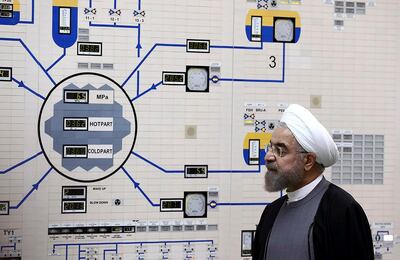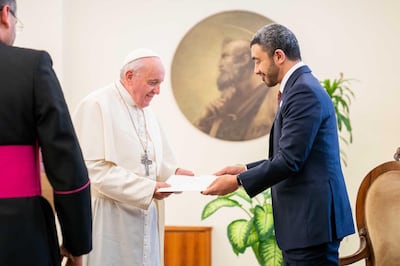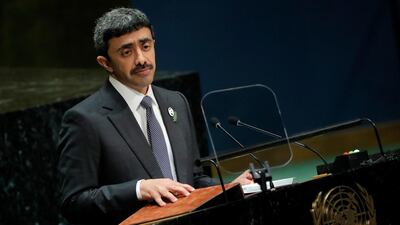Last weekend Sheikh Abdullah bin Zayed, the Minister of Foreign Affairs and International Co-operation, gave the UAE's address to the 74th United Nations General Assembly. His speech came at the end of a week of contrasts in New York, which ranged from the unusually sotto voce appearance of US President Donald Trump to the compelling call to action delivered by young environmental activist Greta Thunberg in her "how dare you?" speech to the climate action summit.
Sheikh Abdullah’s 14-minute address was one of depth and substance. He gave an unequivocal message about the UAE’s foreign policy direction as well as highlighting the stark choice states face in either protecting the future of the region or risking “terrorist groups and destructive extremist ideologies” running amok.
That remark was the concluding point of a speech that offered insight into the country’s guiding principles as well as specific details of its response to a wide range of regional challenges.
Repeatedly, he came back to the need for a nuanced political approach to solving crises and de-escalating tensions. “Building safe communities requires will, practical initiatives and concerted effort to address the tensions caused by extremism,” he said.
Given that his speech was delivered only a few days after the September 14 attacks on Saudi Arabia, for which many in the international community blame Iran, it was no surprise that he tackled this issue head-on, by contextualising the drone strikes on Aramco facilities in Abqaiq and Khurais as threats to regional security and as assaults on the stability of the global economy.
To more widely explore Iran’s confrontational world view, the foreign minister used two key examples: the 2015 nuclear deal and the seizure of Greater and Lesser Tunb and Abu Musa by Tehran in 1971.
On the nuclear deal, the common concern in the region was always that Iran viewed it as a narrow technical agreement that did little to curb its long-term weapons ambitions and subsequently, did little to encourage good behaviour by the regime in Tehran. History has, unfortunately, proved this perspective right.

“The agreement should have also addressed all aspects of Iran’s behaviour, including its interference in the internal affairs of states, its development of a ballistic missile programme and its provision of arms to terrorist groups. We are speaking here about a country that seeks to export its revolution,” he said.
He also spoke of Abu Musa and the Tunbs, three islands illegally occupied by Iran since 1971, having been seized by Tehran as the UAE was being formed. Abu Musa had traditionally belonged to Sharjah and the Tunbs to Ras Al Khaimah when they were both Trucial States before federation.
Iran’s aggression started in the summer of that year. On June 23, 1971, the then shah of Iran, Mohammad Reza Pahlavi, threatened to seize the islands. He followed through on that warning on November 30 the same year.
In New York, Sheikh Abdullah reminded Iran of its long-ignored legal obligations.
“For 48 years, the UAE has never ceased in its demand for its sovereignty and legitimate right over the three islands that are occupied by Iran in flagrant violation of international law and the UN Charter. Historical records clearly prove the UAE’s ownership of these islands and prove that they have been under Arab rule since ancient times,” he said.
Iran stridently maintains its occupation is “permanent and non-negotiable”, a phrase that neatly encapsulates its preference for chaos over consensus and its lack of respect for the rule of law. It has repeatedly rejected the matter of sovereignty being raised at the International Court of Justice.
More broadly, the foreign minister’s speech was one of logic and reality.
Of Yemen, Sheikh Abdullah said that the country has always backed a political process and will continue to strive towards achieving peace. The UAE’s support, in the form of humanitarian and development assistance, has “intensified”, even in the face of Houthi obstruction.
Of the Palestinian cause, which he described as “the central issue of the Arab world”, he said regional stability cannot be achieved “without reaching a just, lasting and comprehensive solution”.
Of the recent tensions in the Strait of Hormuz, he said “we emphasise the need to restore reason, protect maritime navigation and energy supplies".

He also spoke of the unique prescription the UAE has formulated since 1971 and which we see more clearly with each passing year.
The country is often characterised as a regional beacon of stability and he said we need to "spread the values of tolerance and pluralism", citing some of the many examples of success to celebrate, from Hazza Al Mansouri's trip to the International Space Station to the Human Fraternity Document, signed during the Papal visit in February, which occurred during the country's Year of Tolerance.
Piece by piece, a bigger picture takes shape: one in which the UAE is a responsible actor in a region where countries are too often in flux. And one that is a place of tolerance that makes investments in its own people. He talked of “building a new generation in a world based on science, technology and enlightenment” and of the centrality of women and young people to that plan.
It is to the country’s great credit that these are not fanciful ambitions but realisable aims, especially so as the UAE values peace, process and planning, when others too often seek discord and disunity.
Nick March is an assistant editor-in-chief for The National


